英语句子成分和基本句型
英语句子成分及五种基本句型
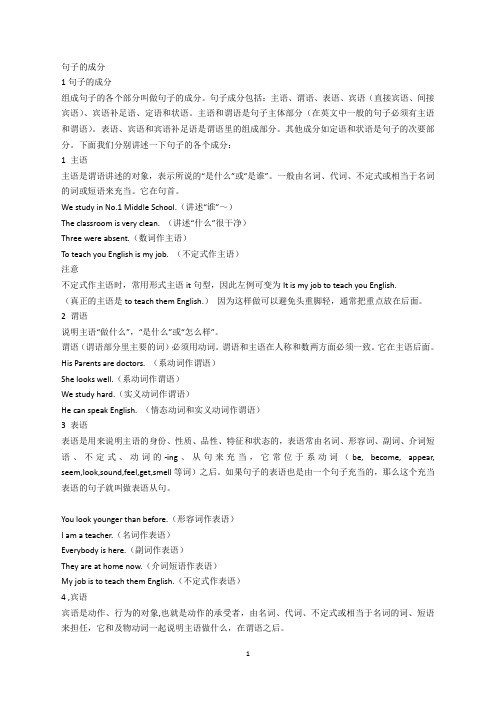
句子的成分1句子的成分组成句子的各个部分叫做句子的成分。
句子成分包括:主语、谓语、表语、宾语(直接宾语、间接宾语)、宾语补足语、定语和状语。
主语和谓语是句子主体部分(在英文中一般的句子必须有主语和谓语)。
表语、宾语和宾语补足语是谓语里的组成部分。
其他成分如定语和状语是句子的次要部分。
下面我们分别讲述一下句子的各个成分:1 主语主语是谓语讲述的对象,表示所说的“是什么”或“是谁”。
一般由名词、代词、不定式或相当于名词的词或短语来充当。
它在句首。
We study in No.1 Middle School.(讲述“谁”~)The classroom is very clean. (讲述“什么”很干净)Three were absent.(数词作主语)To teach you English is my job. (不定式作主语)注意不定式作主语时,常用形式主语it句型,因此左例可变为It is my job to teach you English.(真正的主语是to teach them English.)因为这样做可以避免头重脚轻,通常把重点放在后面。
2 谓语说明主语“做什么”,“是什么”或“怎么样”。
谓语(谓语部分里主要的词)必须用动词。
谓语和主语在人称和数两方面必须一致。
它在主语后面。
His Parents are doctors. (系动词作谓语)She looks well.(系动词作谓语)We study hard.(实义动词作谓语)He can speak English. (情态动词和实义动词作谓语)3 表语表语是用来说明主语的身份、性质、品性、特征和状态的,表语常由名词、形容词、副词、介词短语、不定式、动词的-ing、从句来充当,它常位于系动词(be, become, appear, seem,look,sound,feel,get,smell等词)之后。
如果句子的表语也是由一个句子充当的,那么这个充当表语的句子就叫做表语从句。
英语句子成分和五种基本句型
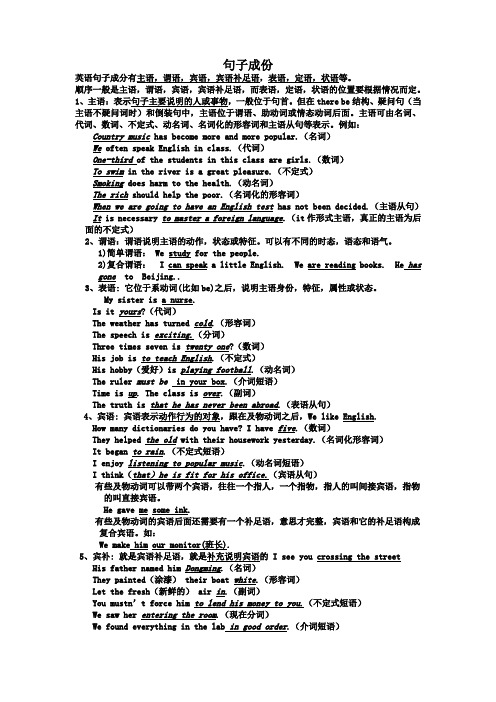
句子成份英语句子成分有主语,谓语,宾语,宾语补足语,表语,定语,状语等。
顺序一般是主语,谓语,宾语,宾语补足语,而表语,定语,状语的位置要根据情况而定。
1、主语:表示句子主要说明的人或事物,一般位于句首。
但在there be结构、疑问句(当主语不疑问词时)和倒装句中,主语位于谓语、助动词或情态动词后面。
主语可由名词、代词、数词、不定式、动名词、名词化的形容词和主语从句等表示。
例如:Country music has become more and more popular.(名词)We often speak English in class.(代词)One-third of the students in this class are girls.(数词)To swim in the river is a great pleasure.(不定式)Smoking does harm to the health.(动名词)The rich should help the poor.(名词化的形容词)When we are going to have an English test has not been decided.(主语从句)It is necessary to master a foreign language.(it作形式主语,真正的主语为后面的不定式)2、谓语:谓语说明主语的动作,状态或特征。
可以有不同的时态,语态和语气。
1)简单谓语: We study for the people.2)复合谓语: I can speak a little English. We are reading books. He hasgone to Beijing..3、表语: 它位于系动词(比如be)之后,说明主语身份,特征,属性或状态。
My sister is a nurse.Is it yours?(代词)The weather has turned cold.(形容词)The speech is exciting.(分词)Three times seven is twenty one?(数词)His job is to teach English.(不定式)His hobby(爱好)is playing football.(动名词)The ruler must be in your box.(介词短语)Time is up. The class is over.(副词)The truth is that he has never been abroad.(表语从句)4、宾语: 宾语表示动作行为的对象,跟在及物动词之后,We like English.How many dictionaries do you have? I have five.(数词)They helped the old with their housework yesterday.(名词化形容词)It began to rain.(不定式短语)I enjoy listening to popular music.(动名词短语)I think(that)he is fit for his office.(宾语从句)有些及物动词可以带两个宾语,往往一个指人,一个指物,指人的叫间接宾语,指物的叫直接宾语。
英语句子成分及基本句型
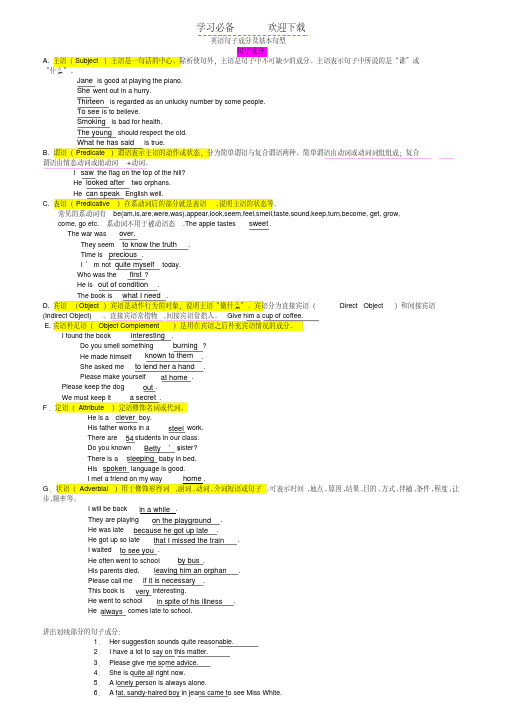
英语句子成分及基本句型句子成分A. 主语(Subject)主语是一句话的中心。
除祈使句外,主语是句子中不可缺少的成分。
主语表示句子中所说的是“谁”或“什么”。
Jane is good at playing the piano.She went out in a hurry.Thirteen is regarded as an unlucky number by some people.To see is to believe.Smoking is bad for health.The young should respect the old.What he has said is true.B. 谓语(Predicate)谓语表示主语的动作或状态,分为简单谓语与复合谓语两种。
简单谓语由动词或动词词组组成;复合谓语由情态动词或助动词+动词。
I saw the flag on the top of the hill?He looked after two orphans.He can speak English well.C. 表语(Predicative)在系动词后的部分就是表语,说明主语的状态等。
常见的系动词有be(am,is,are,were,was),appear,look,seem,feel,smell,taste,sound,keep,turn,become, get, grow,come, go etc.系动词不用于被动语态.The apple tastes sweet.The war was over.They seem to know the truth.Time is precious.I’m not quite myself today.Who was the first?He is out of condition.The book is what I need.D. 宾语(Object)宾语是动作行为的对象,说明主语“做什么”。
英语句子成分和五种基本句型

以上两个句型可以互换: He gave me a pen.=He gave a pen to me. He will buy me some books.=he will buy some books for me. She made me a cake.=she made a cake for me. 4. “疑问词+不定式”作直宾 He taught me how to read the word. She asked me which way to go. I told him what to do. He asked me why to sing this song.
宾语补足语
在英语中,有些句子里只有宾语并不能表达
完整的意思,还必须在宾语后面加上宾语补 足语才能表达完整的意思。我们把“宾语+宾 语补足语”称为复合宾语。名词、形容词、 副词、介词短语、不定式、现在分词、过去 分词都可以做宾语补足语。通常位于宾语之 后。
If
you let me go, I will make you king. Leave the door open. We found Li Ming out when we arrived. Make yourself at home. The manager asked him to wait. I saw her enter the shopping mall. The boss kept him working all day. Yesterday he got his leg broken.
状语
状语用来修饰动词、形容词或副词。一般表示行
为发生的时间、地点、目的、方式、程度等意义, 常由副词、介词短语、不定式、句子或相当于副 词的词或短语来表示。一般放在句末,有时可以 放在句首、句中。 He did it carefully. Without his help, we couldn’t work it out. (In order) to catch up with my classmates, I must study hard. Just as I was leaving, the phone rang again.
英语句子成分及简单句5种基本句型

英语句子成分及简单句5种基本句型一、英语句子成分根据英语词汇在英语句子中的地位和作用, 英语句子的成分可分为主语、谓语、宾语、宾语补足语、表语、定语、状语、同位语及独立成分等。
其中,主语和谓语是句子的主要成分,一般情况下,一个句子不能缺少这两种成分。
现将不同句子成分的用法列举如下:1. 主语:表示句子所要说明或描述的人或事物,一般由名词、代词或相当于名词的词组或句子充当,置于句首。
如:It's getting cold. 天冷起来了。
Now everything is ready. 现在一切都准备好了。
The teacher is very kind to us. 老师对我们很好。
2. 谓语:说明或描述主语的动作、状态或特征,由动词或动词短语充当,位于主语之后。
如:Mother bought me a birthday present. 妈给我买了个生日礼物。
We have finished our work already. 我们已经完成了工作。
3. 表语:表示主语的身份、性质、状态和特征,一般由名词、形容词、或相当于名词、形容词的词、短语或句子充当,位于系动词之后,形成英语独有的主系表结构。
如:Be careful! 小心!All the students are lovely. 所有的学生都很可爱。
He looks very angry. 他看上去很生气。
4. 宾语:指动作所涉及的人或事物,一般由名词、代词或相当于名词的词组或句子充当,位于动词之后。
如:He wrote many plays. 他写了许多剧本。
She loves swimming. 她喜欢游泳。
5. 宾语补足语:用来对宾语进行补充和说明,一般由名词、形容词、副词、介词短语或非谓语动词充当。
如:He told us to stay. 他叫我们留下。
I've never seen her dancing. 我从未看见过她跳舞。
句子的成分和基本句型

句子的成分和基本句型句子的成分和基本句型句子成分:组成句子的各个部分叫作句子成分。
英语的句子成分和中文的句子成分大致相同,可分为:主语,谓语,宾语,表语,定语,状语,宾语补语。
一、主语——表明句子里所谈的是:“什么人”或“什么物”,主语常用名词、代词或相当于名词的词或短语充当。
例如:Lilylikeshernewbike.(名词)莉莉喜欢她的新自行车。
hegetsupearlyeveryday.(代词)他每天都起得很早。
Tolearnenglishwellisnoteasy.(不定式短语)学好英语不容易。
二、谓语——说明主语“做什么”、“是什么”或“怎么样”,英语中谓语只能用动词充当。
例如:weworkhard.我们努力工作。
Theboycaughtabird.那个男孩逮住一只鸟。
heismyfather.他是我父亲。
Theyalllookfine.他们都很好。
谓语和主语在人称和数方面必须保持一致。
例如:Iamreading.Youarereading.he\sheisreading.wearereading.三、宾语——宾语是动作行为的对象。
由名词、代词或相当于名词或代词的词或短语充当,和及物动词一起构成谓语,说明主语“做什么”。
例如:Tomboughtastory-book.(名词)汤姆买了一本故事书。
Isawhimyesterday.(代词)昨天我看到他了。
hewantedtohaveacupoftea.(不定式短语)他想要一杯茶。
直接宾语和间接宾语——有些及物动词可以有两个宾语,一个指人,一个指物,指人的叫作间接宾语,指物的叫直接宾语。
合称双宾。
例如:hegavemesomeink.他给了我一些墨水。
间接宾语直接宾语ourteachertoldusaninterestingstory.老师给我妈讲了一个有趣的故事。
英语句子成分及简单句5种基本句型
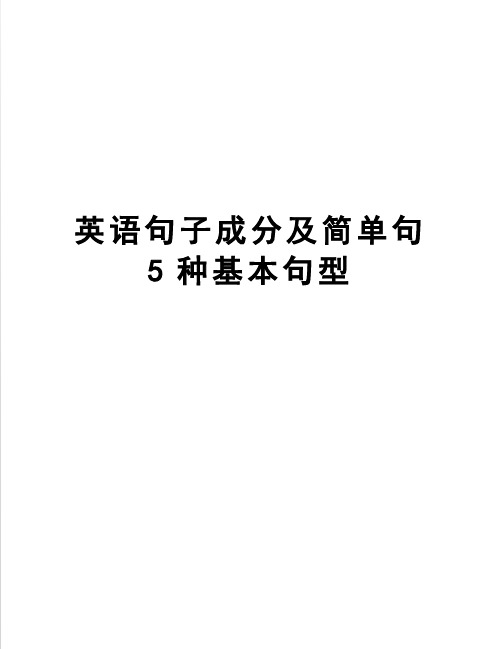
英语句子成分及简单句5种基本句型英语句子成分及简单句5种基本句型一、英语句子成分根据英语词汇在英语句子中的地位和作用, 英语句子的成分可分为主语、谓语、宾语、宾语补足语、表语、定语、状语、同位语及独立成分等。
其中,主语和谓语是句子的主要成分,一般情况下,一个句子不能缺少这两种成分。
现将不同句子成分的用法列举如下:1. 主语:表示句子所要说明或描述的人或事物,一般由名词、代词或相当于名词的词组或句子充当,置于句首。
如:It's getting cold. 天冷起来了。
Now everything is ready. 现在一切都准备好了。
The teacher is very kind to us. 老师对我们很好。
2. 谓语:说明或描述主语的动作、状态或特征,由动词或动词短语充当,位于主语之后。
如:Mother bought me a birthday present. 妈给我买了个生日礼物。
We have finished our work already. 我们已经完成了工作。
3. 表语:表示主语的身份、性质、状态和特征,一般由名词、形容词、或相当于名词、形容词的词、短语或句子充当,位于系动词之后,形成英语独有的主系表结构。
如:Be careful! 小心!All the students are lovely. 所有的学生都很可爱。
He looks very angry. 他看上去很生气。
4. 宾语:指动作所涉及的人或事物,一般由名词、代词或相当于名词的词组或句子充当,位于动词之后。
如:He wrote many plays. 他写了许多剧本。
She loves swimming. 她喜欢游泳。
5. 宾语补足语:用来对宾语进行补充和说明,一般由名词、形容词、副词、介词短语或非谓语动词充当。
如:He told us to stay. 他叫我们留下。
I've never seen her dancing. 我从未看见过她跳舞。
英语句子成分及五种基本句型

1. This is an English-Chinese dictionary. 这是本英汉辞典。
2. The dinner smells good.
午餐的气味很好。
3. Everything looks different.
一切看来都不同了。
4. He is growing tall and strong. 他长得又高又壮
小结
谓语是句子的躯干,说明主语的动作. 谓语动词随着主语的不同而变化, 随着时间的不同而变化, 随 着与主语的不同关系( 主动关系和被动关系)而变化, 总之,时时 在变.
谓语有三种不同的形式:
1) 动词
They planted many trees on the hill .
2) 情态动词 + 动词 You must stay at home .
形容词
The teacher was satisfied with your work.
They are at home now.
介词短语
My job is to teach English.
不定式
Seeing is believing.
动名词
基本句型2: 主+系+表
此句型的句子有一个共同的特点: 句子谓语动词都不能表达一个完整的 意思,必须加上一个表明主语身份或状态的表语构成复合谓语,才能表 达完整的意思。这类动词叫做连系动词。
七种句子基本成分:
I saw a tall boy take your
主谓
ห้องสมุดไป่ตู้
定宾 补
book just now.
状
五种基本句型:
1 主+谓 2 主+系+表 3 主+谓+宾 4 主+谓+间宾+直宾 5 主+谓+宾+宾补
英语句子成分和五个基本句型

名 词.单词作定语时通常放在它所修 (五)定语 是修饰___ 前 饰的名词之_____ ;短语和从句作定语时则放在它所修饰 的名词之_____ 后 。
名词 They are woman workers. Tom's father didn't write home until yesterday. 名词所有格 形容词 adj Mary is a beautiful girl.. 数词 The play has three acts. 形容词 /序数词 /to do 不定式 This is her first trip to Europe. China is a developing country. 现在分词 doing I have nothing to eat. to do 不定式 Those who want to go to Tibet are to sign their names here. 从句
七)宾语补足语。英语有些及物动词,除了要有宾语之 外,还要加上宾语补足语,才能使句子的意义完整。
They elected me captain of the team. 名词 We try to make our country strong. 形容词 We found everything in good order there.介词短语 I should advise you to get the chance. to do 不定式 I saw him going upstairs. 现在分词 doing They found the house broken in. done 过去分词
3.主语 + 谓语 + 宾语
1)The boss employed five more workers. 主语 谓语 宾语 2)My brother takes care of the vegetable garden. 3)Few students like taking exams. 4)He forgot to close the door. 5)I hope I can speak English fluently.
英语的句子成分及五大基本句型

基本句型二:S+V+P.(主+系+表) 这种句型结构主要指谓 语动词为连系动词的情况。 如: She is Peter's sister. 她是彼得的妹妹。 That dog looks dangerous. 那只狗看起来很危险。
基本句型三: S+V+O(主+谓+宾) 英语中绝大多数及物 动词只带一个宾语,这种动词叫单宾语及物动词。 如: Everyone likes him. 大家都喜欢他。 We study English and French. 我们学习英语和法语。
定语:定语为句子的次要成分,起修饰限制名词或代词的作用, 可分为前置定语和后置定语。一般由形容词性物主代词、数词、 形容词、副词、介词短语、动词不定式、分词(短语) 或句子充 当。 例: His father is a doctor. 他父亲是一名医生。 Mr. Green has two sons. 格林先生有两个儿子。 The girl under the tree is Kate. 在树底下的那个女孩是凯特。 The man downstairs couldn’t sleep well. I bought a new dictionary. 我买了本新字典。 Can you find out the answer to the question? A barking dog seldom bites. 吠狗很少咬人。 A man going to die is always kind-hearted. The suggestion sent to the committee was adopted. Do you know the man who is standing next to Mr. Green?
英语句子成分与基本句式结构

四、表语
位于连系动词的后面,用来说明主语的身份、 特征、状态等。构成主系表结构。
例句: 1. This is an English book. 2. You look happy today. 3. They are from America. 4. I don’t feel well today.
英语句子成分和基本句型
句子成分
句子成分: 组成句子的各个部分。 主语 谓语 宾语 表语
状语 定语 补语 同位语
一、主语
句子所陈述的主体,一般位于句首,指动作 的发出者。
例句: 1. You are my friend. 2. My father is a teacher. 3. These girls like English.
第四种:主语+谓语+宾语+宾语补足语.
例句: 1. I can make you happy. 2. They want me to sing. 3. We call him Mr. Smith. 4. The sun keeps us warm.
第五种:主语+连系动词+表语.
例句: 1. My father is happy. 2. She looks beautiful. 3. Her face turns red. 4. My dream(梦想) is to be a scientist.
五、定语
用来修饰、限定、说明名词或代词的品质与特 征的词。
例句: 1. This is a red car. 2. The tall boy is my friend. 3. Harbin is a beautiful city. 4. Mr. Black is a kind and interesting teacher.
英语句子成分和基本句型
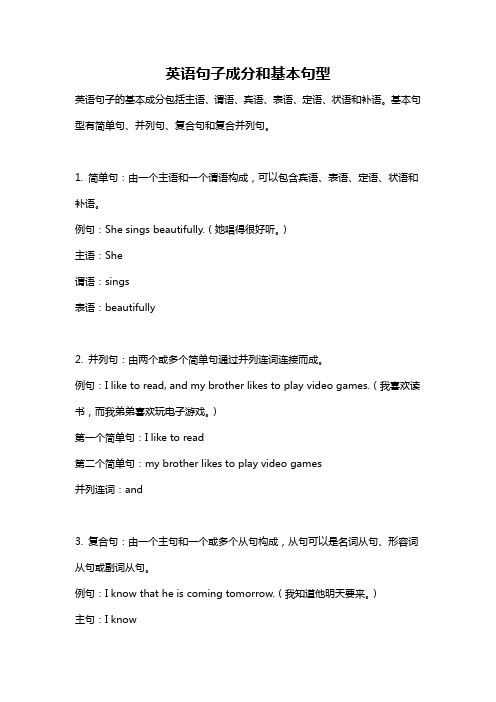
英语句子成分和基本句型英语句子的基本成分包括主语、谓语、宾语、表语、定语、状语和补语。
基本句型有简单句、并列句、复合句和复合并列句。
1. 简单句:由一个主语和一个谓语构成,可以包含宾语、表语、定语、状语和补语。
例句:She sings beautifully.(她唱得很好听。
)主语:She谓语:sings表语:beautifully2. 并列句:由两个或多个简单句通过并列连词连接而成。
例句:I like to read, and my brother likes to play video games.(我喜欢读书,而我弟弟喜欢玩电子游戏。
)第一个简单句:I like to read第二个简单句:my brother likes to play video games并列连词:and3. 复合句:由一个主句和一个或多个从句构成,从句可以是名词从句、形容词从句或副词从句。
例句:I know that he is coming tomorrow.(我知道他明天要来。
)主句:I know名词从句:that he is coming tomorrow4. 复合并列句:由两个或多个复合句通过并列连词连接而成。
例句:She said that she was tired, but she still went to the party.(她说她很累,但她还是去了派对。
)第一个复合句:She said that she was tired第二个复合句:she still went to the party并列连词:but在英语句子中,主语通常是句子的主要话题或执行动作的人或事物。
谓语是句子中的动词,表示主语的动作或状态。
宾语是动作的承受者或影响者。
表语是用来描述或说明主语的词或词组。
定语是用来修饰名词或代词的词或词组。
状语是用来修饰动词、形容词、副词或整个句子的词或词组。
补语是用来补充或说明主语或宾语的词或词组。
英语句子成分大全

英语句子成分大全英语句子的基本结构可以归纳成五种基本句型及其扩大、组合、省略或倒装。
掌握这五种基本句型,是掌握各种英语句子结构的基础。
下面是小编为你整理的有关英语句子成分大全,欢迎阅读!英语五种基本句型列式如下:一: S V (主+谓)二: S V P (主+系+表)三: S V O (主+谓+宾)四: S V o O (主+谓+间宾+直宾)五: S V O C (主+谓+宾+宾补)基本句型一:S V (主+谓)主语:可以作主语的成分有名词(如boy),主格代词(如you),动词不定式,动名词等。
主语一般在句首。
注意名词单数形式常和冠词不分家!谓语:谓语由动词构成,是英语时态、语态变化的主角,一般在主语之后。
不及物动词(vi.)没有宾语,形成主谓结构,如:We come.此句型的句子有一个共同特点,即句子的谓语动词都能表达完整的意思。
这类动词叫做不及物动词,后面可以跟副词、介词短语、状语从句等。
S │ V (不及物动词)1. The sun │was shining.太阳在照耀着。
2. The moon │rose. 月亮升起了。
3. The universe │remains. 宇宙长存。
4. We all │breathe, eat, and drink. 我们大家都呼吸、吃和喝。
5. Who │cares? 管它呢?6. What he said │does not matter. 他所讲的没有什么关系。
7. They │talked for half an hour. 他们谈了半个小时。
8. The pen │writes smoothly 这支笔书写流利。
基本句型二: S V P (主+系+表)此句型的句子有一个共同的特点:句子谓语动词都不能表达一个完整的意思,必须加上一个表明主语身份或状态的表语构成复合谓语,才能表达完整的意思。
这类动词叫做连系动词。
系动词分两类:be, look, keep, seem等属一类,表示情况;get, grow, become, turn等属另一类,表示变化。
英语句子成分及简单句5种基本句型
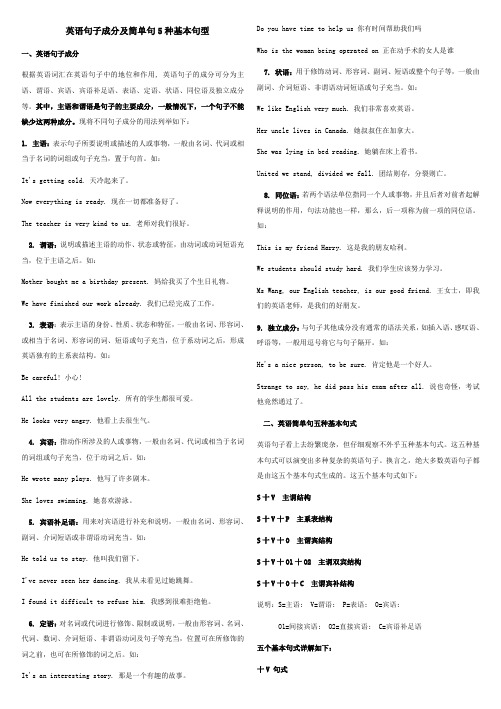
英语句子成分及简单句5种基本句型一、英语句子成分根据英语词汇在英语句子中的地位和作用, 英语句子的成分可分为主语、谓语、宾语、宾语补足语、表语、定语、状语、同位语及独立成分等。
其中,主语和谓语是句子的主要成分,一般情况下,一个句子不能缺少这两种成分。
现将不同句子成分的用法列举如下:1. 主语:表示句子所要说明或描述的人或事物,一般由名词、代词或相当于名词的词组或句子充当,置于句首。
如:It's getting cold. 天冷起来了。
Now everything is ready. 现在一切都准备好了。
The teacher is very kind to us. 老师对我们很好。
2. 谓语:说明或描述主语的动作、状态或特征,由动词或动词短语充当,位于主语之后。
如:Mother bought me a birthday present. 妈给我买了个生日礼物。
We have finished our work already. 我们已经完成了工作。
3. 表语:表示主语的身份、性质、状态和特征,一般由名词、形容词、或相当于名词、形容词的词、短语或句子充当,位于系动词之后,形成英语独有的主系表结构。
如:Be careful! 小心!All the students are lovely. 所有的学生都很可爱。
He looks very angry. 他看上去很生气。
4. 宾语:指动作所涉及的人或事物,一般由名词、代词或相当于名词的词组或句子充当,位于动词之后。
如:He wrote many plays. 他写了许多剧本。
She loves swimming. 她喜欢游泳。
5. 宾语补足语:用来对宾语进行补充和说明,一般由名词、形容词、副词、介词短语或非谓语动词充当。
如:He told us to stay. 他叫我们留下。
I've never seen her dancing. 我从未看见过她跳舞。
句子成分与基本句型

句子成分与基本句型英语的句子成分总共七个英语的句子成分总共七个: : : 主语、谓语、宾语、表语、补语、定语、状语。
主语、谓语、宾语、表语、补语、定语、状语。
一、主语主语是一个句子叙述的主体。
我们可以这样理解,我们可以这样理解,主语就是一句话主要叙述的对象,主语就是一句话主要叙述的对象,主语就是一句话主要叙述的对象,或者这句话主或者这句话主要讲的内容。
这句话主要讲什么,这个“什么”就是主语。
例如要讲的内容。
这句话主要讲什么,这个“什么”就是主语。
例如 I am a teacher I am a teacher I am a teacher(我是老师)(我是老师),主要讲的是“I I ””。
而不是“。
而不是“teacher teacher teacher”” . . 所以所以“I”是主语。
“I”是主语。
Chinese is hard Chinese is hard Chinese is hard 这里主要讲的是这里主要讲的是“Chinese Chinese”” ,而不是“hard hard””.所以Chinese Chinese 是主语。
是主语。
一般来说,能够充当主语的词语有:名词、代词、数词、动词不定式、动名词、句子、其他。
1、名词名词都可以做主语。
但是什么是名词?名词就是世间万物的名称。
世间万物,不管看得见的,还是看不见的都有一个名称。
比如我们自己的名称,就是人名。
比如 Tom, Mary. Tom, Mary.地方的名称,就是地名。
地方的名称,就是地名。
比如,比如, China China China、、Guangdong Guangdong、、Puning Puning。
我们生活中,所有可以看见的物品,比如,电脑(我们生活中,所有可以看见的物品,比如,电脑(computer computer computer))、书(book)(book)、房子、房子、房子(house)(house)(house)、、钢笔钢笔(pen)(pen)(pen)等等。
英语中的句子成分及五种基本句型分析
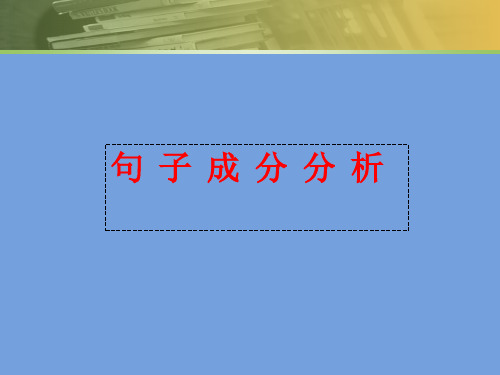
a doctor. 状语阐明了动词的哪些方面的特点?
❖1. 小李回家后,立刻就睡觉去了。
❖Xiao Li went to bed as soon as he came home.
❖ 6.这种特殊的恐龙是我们国家发现的。 ______________________________________
❖ 7.我没有笔写字。 ______________________________________
❖ 8.照片中的王太太看起来很年轻。 ______________________________________
P happy.
nice. red.
基本句型三 主谓宾
❖S+V+O ❖We study English everyday. ❖They are playing football. ❖He enjoys reading. ❖She said “Good morning.”
基本句型三 主谓宾
S
V
O
We They He She
❖4. He is a man s_u_it_a_b_l_e_f_o_r_t_h_e_j_ob.
你能归纳出定语的位置吗?
定语阐明名词特点,性质; 状语则阐明 动词何如何.
❖1. We _o_ft_e_n help him. ❖2. I r_e_a_ll_y don’t like the food. ❖3. He did his homework c_a_re_f_u_l_ly ❖a_t_h_o_m__e. ❖4.Her mother goes _o_u_t _to__d_o__s_o_m_e___
句子成分和五种基本句型

定语: 在句中修饰名词或代词的成分
• He is a new student. • China is a developing country. • He is reading a book about how to learn English.
状语: 修饰动词,形容词,副词以及全句的句子成分。 按用途可分为:地点、时间、原因、目的、结果、条 件、让步、程度、方式、伴随情况等
• • • • •
These books are interesting. Tom is happy. Tom is very happy today. The story sounds interesting. He became a teacher six years ago.
The weather turns cold.
主语+谓语+宾语+宾语补足语(+状语)We made im the manager.
组成句子
主语+谓语+宾语+宾语补足语(+状语) He made us stand here quietly yesterday. 主语+谓语+直接宾语+间接宾语
They are painting the door green. What makes him so happy? He tells us funny stories. I am showing him my pictures. I saw them getting on the bus. He passes her nothing. He asked me to come back soon. I will give my car a wash. They find the house empty.
英语句子成分及基本句型
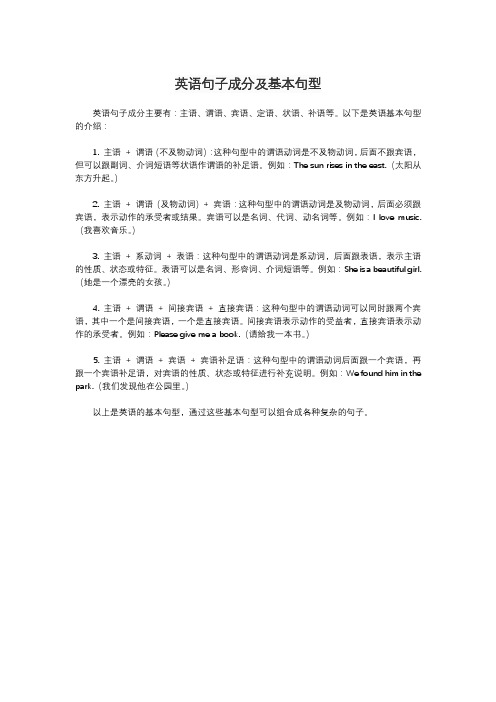
英语句子成分及基本句型
英语句子成分主要有:主语、谓语、宾语、定语、状语、补语等。
以下是英语基本句型的介绍:
1. 主语+ 谓语(不及物动词):这种句型中的谓语动词是不及物动词,后面不跟宾语,但可以跟副词、介词短语等状语作谓语的补足语。
例如:The sun rises in the east.(太阳从东方升起。
)
2. 主语+ 谓语(及物动词)+ 宾语:这种句型中的谓语动词是及物动词,后面必须跟宾语,表示动作的承受者或结果。
宾语可以是名词、代词、动名词等。
例如:I love music.(我喜欢音乐。
)
3. 主语+ 系动词+ 表语:这种句型中的谓语动词是系动词,后面跟表语,表示主语的性质、状态或特征。
表语可以是名词、形容词、介词短语等。
例如:She is a beautiful girl.(她是一个漂亮的女孩。
)
4. 主语+ 谓语+ 间接宾语+ 直接宾语:这种句型中的谓语动词可以同时跟两个宾语,其中一个是间接宾语,一个是直接宾语。
间接宾语表示动作的受益者,直接宾语表示动作的承受者。
例如:Please give me a book.(请给我一本书。
)
5. 主语+ 谓语+ 宾语+ 宾语补足语:这种句型中的谓语动词后面跟一个宾语,再跟一个宾语补足语,对宾语的性质、状态或特征进行补充说明。
例如:We found him in the park.(我们发现他在公园里。
)
以上是英语的基本句型,通过这些基本句型可以组合成各种复杂的句子。
句子成分和基本句式
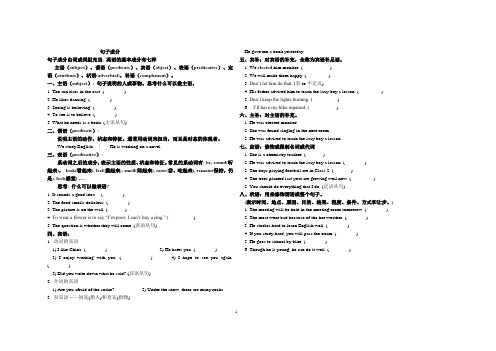
句子成分句子成分由词或词组充当, 英语的基本成分有七种主语(subject)、谓语(predicate)、宾语(object)、表语(predicative)、定语(attribute)、状语(adverbial),补语(complement)。
一、主语(subject): 句子说明的人或事物。
思考什么可以做主语。
1. The sun rises in the east. ( )2. He likes dancing. ( )3. Seeing is believing. ( )4. To see is to believe. ( )5. What he needs is a book. (主语从句)二、谓语(predicate):说明主语的动作、状态和特征。
通常用动词来担当,而且是时态的体现者。
We study English. | He is working on a novel.三、表语(predicative):系动词之后的成分,表示主语的性质、状态和特征。
常见的系动词有: be, sound(听起来),look(看起来), feel(摸起来), smell(闻起来), taste(尝、吃起来), remain(保持,仍是), feel(感觉) ….思考: 什么可以做表语?1.It sounds a good idea. ( )2.The food smells delicious. ( )3.The picture is on the wall. ( )4.To wear a flower is to say “I’m poor, I can’t buy a ring.” ()5.The question is whether they will come. (表语从句)四、宾语:1. 动词的宾语1) I like China. ( ) 2) He hates you. ( )3) I enjoy working with you. ( ) 4) I hope to see you again. ( )5) Did you write down what he said? (宾语从句)2. 介词的宾语1) Are you afraid of the snake? 2) Under the snow, there are many rocks. 3. 双宾语——间宾(指人)和直宾(指物)He gave me a book yesterday.五、宾补:对宾语的补充,全称为宾语补足语。
英语学习中的基本句型结构和句子成分
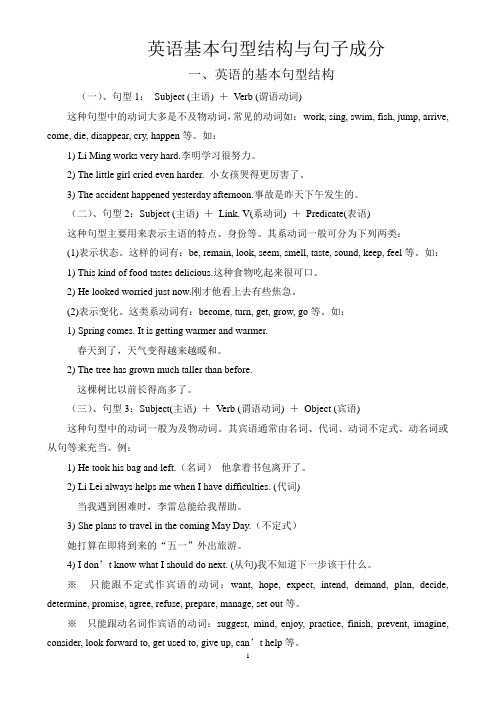
英语基本句型结构与句子成分一、英语的基本句型结构(一)、句型1:Subject (主语) +Verb (谓语动词)这种句型中的动词大多是不及物动词,常见的动词如:work, sing, swim, fish, jump, arrive, come, die, disappear, cry, happen等。
如:1) Li Ming works very hard.李明学习很努力。
2) The little girl cried even harder. 小女孩哭得更厉害了。
3) The accident happened yesterday afternoon.事故是昨天下午发生的。
(二)、句型2:Subject (主语) +Link. V(系动词) +Predicate(表语)这种句型主要用来表示主语的特点、身份等。
其系动词一般可分为下列两类:(1)表示状态。
这样的词有:be, remain, look, seem, smell, taste, sound, keep, feel等。
如:1) This kind of food tastes delicious.这种食物吃起来很可口。
2) He looked worried just now.刚才他看上去有些焦急。
(2)表示变化。
这类系动词有:become, turn, get, grow, go等。
如:1) Spring comes. It is getting warmer and warmer.春天到了,天气变得越来越暖和。
2) The tree has grown much taller than before.这棵树比以前长得高多了。
(三)、句型3:Subject(主语) +Verb (谓语动词) +Object (宾语)这种句型中的动词一般为及物动词。
其宾语通常由名词、代词、动词不定式、动名词或从句等来充当。
例:1) He took his bag and left.(名词)他拿着书包离开了。
- 1、下载文档前请自行甄别文档内容的完整性,平台不提供额外的编辑、内容补充、找答案等附加服务。
- 2、"仅部分预览"的文档,不可在线预览部分如存在完整性等问题,可反馈申请退款(可完整预览的文档不适用该条件!)。
- 3、如文档侵犯您的权益,请联系客服反馈,我们会尽快为您处理(人工客服工作时间:9:00-18:30)。
学习好资料欢迎下载句子成分英语的句子成分主要有六种:即主语、谓语、宾语、定语、状语和补语。
(可以熟记为:主谓宾,定状补)除了这六种主要成分之外,还有“表语”和“同位语”的说法。
但表语和系动词一起作谓语,因此划分成分时,划分在谓语上。
同位语分为主语同位语和宾语同位语,属于主语或宾语的一部分。
主语主语是一个句子所叙述的主体,一般位于句首,通常由名词性的词来充当。
可以作主语的词性或语法结构:1.名词2.代词3.数词4.名词化的形容词(如the rich)5.不定式6.动名词7.主语从句等表示。
During the 1990s, American country music has become more and more popular.We often speak English in class.One-third of the students in this class are girls.To swim in the river is a great pleasure.Smoking does harm to the health.The rich should help the poor.When we are going to have an English test has not been decided.It is necessary to master a foreign language.That he isn’t at home is not true.改正下列句中的错误,并说明原因。
He failed the exam is the reason why he dropped out.That why he was late for school was that his mother was ill.Beyond the mountains lie a small village.Gone is the days when I had to go to school on foot.Play basketball is my favorite sport.Give up English is not an option.谓语谓语由动词充当,说明主语所做的动作或具有的特征和状态。
谓语的构成如下:简单谓语:由一个动词或动词短语构成。
如:He practices running every morning.He reads newspapers every day.复合谓语:由情态动词或其他助动词加动词构成。
如:You may keep the book for two weeks. He has caught a bad cold. My sister is crying over there.I have been waiting for you all the time.I would stay at home all day.由系动词加表语构成。
系动词不能单独作谓语,要和表语一起作谓语。
如:We are students.Your idea sounds great.表语表语多是形容词,用以说明主语的身份、特征和状态,它一般位于系动词(如be, become, get, look, grow, turn, seem等)之后。
表语一般由名词、代词、形容词、分词、数词、不定式、动名词、介词短语、副词及表语从句表示。
Our teacher of English is an American.Is it yours?The weather has turned cold.The speech is exciting.Three times seven is twenty one.His job is to teach English.His hobbyis playing football.The machine must be under repairs.The truth is that he has never been abroad.宾语宾语由名词性的词充当,表示动作的对象或承受者,一般位于及物动词和介词后面。
宾语分为动词宾语和介词宾语,分别构成动宾结构和介词结构。
They planted many trees yesterday.(How many dictionaries do you have?) I have five. They helped the old with their housework yesterday.I wanted to buy a car.I enjoy listening to popular music.I think(that)he is fit for his office.宾语补足语英语中有些及物动词,除有一个直接宾语以外,还要有一个宾语补语,才能使句子的意义完整。
宾语补足语和宾语构成逻辑上的主谓关系。
换句话说,在意思上,宾语相当于宾补的主语。
带有宾语补足语的一般句型为:某些及物动词(如make 等)+宾语+宾补。
宾补可由名词、形容词、副词、不定式、分词、介词短语和从句充当。
His father named him Dongming.They painted their boat white.Let the fresh air in.You mustn’t force him to lend his money to you.We saw her entering the room.We found everything in the lab in good order.We will soon make our city what your city is now.I want your homework done on time.主补对主语的补充。
含有宾语补足语的句子在变成被动语态,宾语作主语时,原来的宾补就成了主语补足语。
He was elected monitor.She was found singing in the next room.定语定语是对名词或代词起修饰、限定作用的词、短语或句子,汉语中常用“……的”表示。
定语通常位于被修饰的成分前。
在英语中,许多情况下,定语是放在所修饰词后面的。
The next man is a scientist.1.形容词短语作定语一般放在所修饰词之后。
The man next to me is a scientist.(我旁边的那个人)2.副词用作定语一般要后置。
People there are very friendly. (那儿的人们)He didn’t like the man downstairs. (楼下的那个人)3.介词短语作定语时要后置。
The boy under the tree is Tom.(树下的那个男孩)The tallest boy in our class is John.(我们班最高的那个男孩)4.现在分词短语、过去分词短语、动词不定式作定语常后置。
I have something to say. (我有要说的话)The boy crying over there is my classmate.(在那边哭的那个男孩)The house built last year is impressive.(去年建的那座房子)The letter on the desk is for Mr. Wu.The woman with a baby in her arms is his mother.We need a place twice larger than this one.She carried a basket full of eggs.The man downstairs was trying to sleep.There are lots of places of interest needing repairing inour city.Tigers belonging to meat-eating animals feed on meat.He picked up a wallet lying on the ground on the way back home.There are many clothes to be washed.Most of the singers invited to the party were from America.Then the great day came when he was to march past the palace in the team.状语说明动作或状态特征的句子成分,叫作状语。
He writes carefully. He walks slowly.(认真地写,慢慢地走,修饰动词用副词,作状语)This material is environmentally friendly.(修饰形容词用副词,作状语)He runs very slowly.(修饰副词slowly, 因此very是副词,作状语)Unfortunately, he lost all of his money. (修饰整个句子用副词,作状语)状语按意义分类在句子成分中,主语、谓语、宾语、定语、表语、补语都比较好辨认,如果这几个成分都不是,那很可能就是状语了。
因此,状语的种类很多,可以表示时间、地点、原因、目的、结果、程度、条件、方式和让步等。
指出下列画线部分属于什么状语。
1.How about meeting again at six?2.Mr. Smith lives on the third floor.st nightshe didn’t go to the dance party becauseof the rain.4.She put the eggs into the basket with great care.5.She came in with a dictionary in her hand.6.In order to catch up with the others, I must workharder.7.To make his dream come true, Tom becomes very interested in business.8.The boy needs a pen very much.9.He was so tired that he fell asleep immediately.10.She works very hard though she is old.11.I shall go there if it doesn’t rain.同位语同位语是在名词或代词之后并列名词或代词对前者加以说明的成分,近乎于后置定语。
